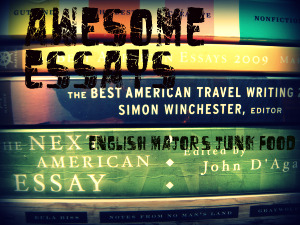Merry Wanderer of the Night:
awesome essays
Awesome Essays: A Field of Silence

Montaigne Readalong Week Seven

Awesome Essays: ...Yielding to the Glory of the Gnarled...

Montaigne Readalong: Week Five

Awesome Essays: Birdwatching in Fresno

Sunday Salon: An Essay? Isn't That The Thing I Had To Write In School?

Montaigne Mondays: Week Three

Awesome Essays: Want to be My Boyfriend? Please Define

Awesome Essays: Tricycle

Awesome Essays: Compulsory Reading

Awesome Essays: What is Creative About Creative Nonfiction?

Awesome Essays: An End to Sweet Illusions

2011 Montaigne Readalong

Awesome Essays: Speaking American

Awesome Essays: Chekhov For Children

NaNoWriMo: Calling it Quits and What it Means to Essay

Awesome Essays: Walking With an Essayist

Awesome Essays: In Bed

Awesome Essays: How to Write About Africa

Awesome Essays: The Best of Times. Worst of Times

